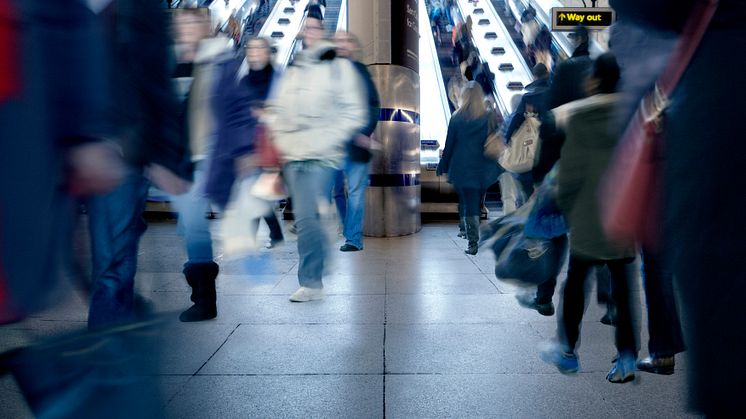Press release -
‘Replace short haul flights with high speed rail’ say citizens around the world
Global survey of public transport attitudes shines light on demand for green travel
- Around the world, 64% support banning air travel where high speed rail alternative exists and 56% support air taxes to fund new high speed rail lines
- New Hitachi Rail commissioned survey of 12,000 people in 12 global cities also finds over one-third of people expect to travel more by train in next five years
- Within cities, 72% would use public transport more if it was better connected, with shorter journey times the biggest factor for growing usage globally.
Two-thirds (64%) of people around the world back banning air travel where high speed rail alternatives exist, according to a major report commissioned by Hitachi Rail.
The survey, carried out by SavantaComres, collected data from 12,000 people in 12 different cities around the world: Berlin, Copenhagen, Dubai, London, Milan, Paris, San Francisco, Singapore, Sydney, Toronto, Warsaw and, Washington D.C. This is the second year in a row that Hitachi Rail has commissioned such research.
The study offers policymakers, operators and transport planners, powerful insights into what motivates a person’s transport decisions within and between cities.
Growing demand for green long-distance travel
Globally, peoples’ default choices for long distance travel (2.5 hours or more) is made up of 46% choosing to drive, 34% traveling by train and 16% flying. How people travel is not set in stone though and respondents believe that their travel habits will change in the next five years. Globally, over one-third (35%) expect to travel more by train, while 6% believe they will travel more by plane and 17% by car. When it comes to questions around funding more green travel, 56% support raising air taxes to finance new high speed rail, with only one third against the idea.
Growing green long-distance public transport usage is critical to hitting carbon emission reduction targets and meeting global Net Zero requirements, and the research highlights how to achieve this modal shift. Of the respondents whose default long-distance travel mode was car or plane, 63% would switch to traveling by train if it was an hour quicker and 75% would switch to traveling by train if it was cheaper.
While sustainability factors may not drive how people travel – only an important factor to 14% – the research does show that respondents back green legislative interventions. A significant majority (64%) of respondents stated they would support banning short-haul flights where high-speed rail alternatives exist. With governments increasingly exploring legislative interventions to encourage green travel, it is notable that respondents in France – where a similar policy was enacted last year – were the most supportive of this proposal (75%) out of anywhere globally.
Growing Urban public transport
When travelling within cities, driving remains the most likely mode of transport for the majority of people, but other modes of transport are increasingly important, with train and bus ridership increasing by around one-third over the past year as part of a post-Covid revival. For commuters, 60% of journeys involve a car, and 60% involve another mode of transport.
So, what barriers need to be circumnavigated to boost public transport usage? Crowding remains the single biggest barrier to people using public transport,(49%, up 1% from last year’s research); however, one of the issues associated with crowding – Covid-19 concerns – is no longer perceived as a major barrier (falling from 42% to 16%). In this context, 78% would be more likely to use public transport if they could avoid crowding. Interestingly, this factor becomes consistently less relevant with age (84% for 18-24yr olds versus 63% for 65+ age bracket).
There is also a demand to use public transport more in the future, with 72% saying they would be more likely to use public transport if it was better connected. This support ranges from as high as 87% in Dubai and 85% in Milan and Warsaw, to lower levels in Washington D.C. (56%) and Copenhagen (57%). Globally, almost half (49%) would still support the idea of a better connected public transport system even if it were more expensive.
Giuseppe Marino, CEO of Hitachi Rail, said: “Policy makers and transport operators must take note of the high demand for better connected public transport. Almost two-thirds of people are prepared to see short haul flights banned where high speed rail alternatives exist, and 56% of people also back increased air taxes to fund high speed rail.
“Our new research shows that there is a genuine demand for more green travel. Over one-third of people expect to travel more by train in the next five years and 72% would use better connected urban transport even more. The challenge now as an industry is to continue to grow seamless and sustainable rail travel at pace to meet this global demand.”
Hitachi Rail is helping to deliver seamless, sustainable transport within and between cities around the world. The company is an expert in every part of the railway. It is able to use its manufacturing and digital signalling expertise to deliver urban transport solutions such as its cutting-edge autonomous metros in Milan and Copenhagen. The company pioneers high-speed solutions such as the iconic Shinkansen Bullet train in Japan and the ETR1000, which is providing seamless, sustainable travel for passengers across Italy, Spain and France.
An in-depth overview and analysis of the data can be found here.
ENDS
Notes to Editors
The fieldwork for the survey was conducted by Savanta ComRes in December 2023
- Sample of approx 1000 people were surveyed in each of the following: London, Berlin, Milan, Dublin, Warsaw, Washington, San Francisco, Toronto, Paris, Singapore, Sydney, Copenhagen.
- ‘Long-distance travel’ was defined as any journey of at least 2.5 hours
- Hitachi Rail’s full report can be downloaded here: https://www.hitachirail.com/better-connected/
Topics
About Hitachi Rail:
Hitachi Rail is connecting the future of mobility - helping every passenger, customer and community enjoy the benefits of more seamless, sustainable transport.
With innovative technology and world-leading delivery capabilities, Hitachi Rail is a trusted partner to customers and consortia partners globally. The company is an expert in every part of the railway: from train manufacturing and maintenance to digital signalling and smart mobility. Its pioneering products, such as the iconic high speed bullet train, enable billions of passenger journeys and the transport of millions of tonnes of freight, every year.
Drawing on the powerful expertise of the wider Hitachi group companies, Hitachi Rail is uniquely placed to further enhance its offer to customers through pioneering new digital solutions and services.
In FY22, Hitachi Rail had revenues of over €5bn. The company has almost 15,000 employees in 38 countries, and it invests in its diverse and talented teams.
Hitachi Rail’s business is local, but its reach is global. With deep roots in its communities, the company is committed to delivering sustainable progress for all.
Find out about more by visiting hitachirail.com


